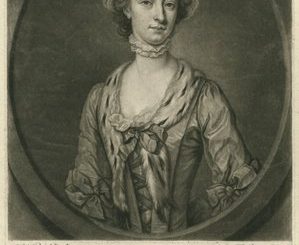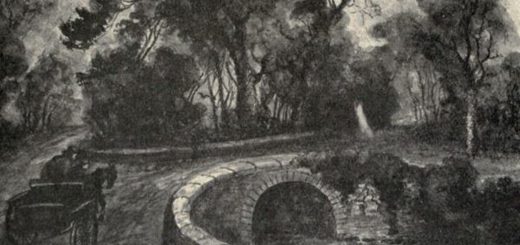Elsie Marshall
Elsie Marshall was born on 9 November 1869 in Birchfield, Birmingham where her father Rev J W Marshall was the parish minister. In 1874 they moved to Blackheath in London her father became minister of St Johns Church, which had been built in 1853. In November 1891 Rev Robert Warren Stewart and his wife, Louisa Kathleen Stewart spoke in St Johns Parish Church about the need for female missionaries in China and on 14 October 1892, after nursing training at Mildmay Hospital, Bethnal Green, Elsie Marshall sailed to China on the steamship Arcadia. On 1 August 1895 she was murdered and her ghost is said to haunt her former home in Blackheath.
In 1892 a group of Buddist’s that had taken a vow vegetarianism and were hence referred to as Vegetarians, assumed control of various aspects of local government in the Gutian area. They were unopposed by the local police but the Vegetarians believed ‘or pretended to believe’ (according to ‘For His Sake: A Record Of A Life Consecrated To God And Devoted To China’) that the Christian Missionaries led by Rev Stewart helped the Chinese raise money to pay for soldiers to suppress them.
In a letter dated 11 October 1894, Elsie says: ‘Lately there has been rather a bad persecution at a village we pass through on the way to Gang-ka. Before I came back I heard there was trouble, and I was afraid it was some sin amongst the Christians, several cases of which I am sorry to say have lately occurred: but when I heard it was persecution because the people were Christians, I did just praise the Lord; it seemed such a proof that real work is going on, and the devil is getting anxious. At this place, A-deng-bang, there is a sect of Vegetarians. They are a secret society, very dangerous and powerful, greatly opposed to Christianity. A fire broke out in some house in the village, and they said it was caused by the Christians. They went into their fields and carried oft” all their harvest, and said if they accused them of doing it they would kill them. Of course they all came to Mr. Stewart, and it has been a very difficult time for him. At last he went himself to the mandarin, a very extreme thing for him to do, since he cannot bear appealing to the mandarins on behalf of the Christians; but he felt it must be done this time. The mandarin has taken it up, and I think he is putting an end to the persecution, but the Christians have suffered. It was a narrow escape of their lives with some of them. The Vegetarians said that Christianity is getting on far too fast, and they are going to make a stand against it. Isn’t that good news? They will find it rather difficult to do that, won’t they? They can’t get on much when they are fighting against God.’
On 8th April 1895 Rev Stewart wrote the following description of troubles with the Vegetarians in a letter:
Ten days ago we were awakened at 4 o’clock in the morning by a native clergyman who crossed the river in order to bring us the startling news that the Vegetarian rebels were expected at daylight to storm Ku-Cheng. The gateways of the city were being blocked with timber and stone in order to prevent their entry. We had 100 men, women and children in our compound outside the town. We passed a terrible time of suspense until daybreak, when torrents of rain fell, and the Vegetarians, not liking the rain, postponed the attack. All the mission party started to get inside of Ku-Cheng. The male and female staffs, in the early morning, after crossing the river in small parties in a tiny boat, reached Kueseng wall, which was blocked and had to be scaled with ladders. During the three following days bodies of citizens guarded the walls, armed with prongs and rusty swords. On the fourth day the gates were opened and the mandarin in command conferred with the Vegetarian leaders. What occurred during this interview we do not know. But nobody believes we have seen the end of this matter. Such a serious affair cannot be so easily patched up and is probably only begun… All the women and children on the advice of the American and British consuls, will be sent to the coast. The opinion prevails that if the Japo-Chinese treaty is arranged soldiers will be sent from Fu-Chow to arrest the leaders of the rebels. But, if it is not arranged, then the Vegetarians will increase sufficiently to make the rising a success.
Elsie also wrote a letter detailing this time period:
Sek-chek-du, March 29, 1895. — We are on the eve of an insurrection in Ku-cheng. A rising among the Vegetarians has been secretly reported to the mandarins. They have mustered 3,000 strong in the city. Mr. Stewart wrote to Topsy and me this afternoon to tell us to go in to-morrow morning. He says all the ladies must go in within the city walls, or else down to Foochow, our compound being outside the city, and the city gates being shut. We could not start from here till to-morrow midday, as Miss Gordon is itinerating in a place half a day’s journey from here, so we must wait till she passes through to-morrow, and go with her. In the meanwhile we improved the shining hours by sending a messenger to Ku-cheng with a note to Mr. Stewart, begging him to let us stay here. It seems so mean to run away and leave the women, after teaching them to trust in God. To run away at the first note of danger seems like preaching what we don’t believe. Topsy and I can’t bear the thought of going in for that. But we trust Mr. Stewart implicitly. He is no coward, and he said how sorry he was to ask us to do it; he knows how we should hate to come in. So of course we shall do what he says when the letter comes to-morrow, but we shall feel it awfully to go. However, if it is the Lord’s will, it must be all right. We do not know whether the women here will be in danger; if so, we have begged Mr. Stewart to let us stop and be with them.
Our servant is in rather a fright, as he says he has seen 300 Vegetarians in the next village this afternoon with swords and weapons. The women are so good, and not at all frightened ; they say they are trusting in God. We have not even our catechist here, as he had to go into Ku-cheng yesterday.
But this matter is far less absorbing than another which happened yesterday. In the afternoon we were asked to take in a man here who was possessed with the devil. It was beautiful because there were several others in the same state in his house, and his wife and others felt that in this house, which is used for a chapel, there was no fear of devils, and all was peaceful. The catechist (the doctor) put it so beautifully; he said they felt that coming to chapel was like coming under God’s wing, and that is just what we want this house to be. So as there was room the doctor said he might come in ; so in he came, with two or three men to look after him. We read to him about the devil being cast out, and then prayed; but, just as in the case before, when we wanted him to kneel the devil seemed to put forth all his power, and he struggled away and tried to run down the stairs. His wife said he had not been so violent at home, and it was because the devil was afraid when we prayed. The doctor having gone into Ku-cheng to-day, Topsy and I have had a good time with him and with the men who are here looking after him.
We have had to come in to Ku-cheng. Mr. Stewart said we must, as Sek-chek-du is a rendezvous for the Vegetarians, and we were comforted to find that it is much more dangerous for us than for the natives. It is not an attack on the Christians, but an insurrection, and they have a special raid on the foreigners; so it would be really worse for the Christians if we stayed, as we would attract the Vegetarians to the house.
 ]At dawn on 1st August 1895 the Kucheng Massacre began as roughly eighty Vegetarians armed with blades, spears and tridents attacked Gutian Huashan where the missionaries were asleep. The Vegetarians killed Rev Robert Warren Stewart, Louisa Kathleen Stewart, Hilda Sylvia Stewart (baby), Herbert Stewart (age 5), Helena Yellop (the children’s nurse), (Nellie)Elizabeth Maud Saunders in one of the houses and Miss Flora Lucy Stewart, Miss Hessie Newcombe, Miss Marry Ann Christina Gordon, (Topsy)Harriette Elinor Saunders, and Miss Elsie Marshall (age 26) in the second house. The martyred missionaries were buried at Fuzhou.
]At dawn on 1st August 1895 the Kucheng Massacre began as roughly eighty Vegetarians armed with blades, spears and tridents attacked Gutian Huashan where the missionaries were asleep. The Vegetarians killed Rev Robert Warren Stewart, Louisa Kathleen Stewart, Hilda Sylvia Stewart (baby), Herbert Stewart (age 5), Helena Yellop (the children’s nurse), (Nellie)Elizabeth Maud Saunders in one of the houses and Miss Flora Lucy Stewart, Miss Hessie Newcombe, Miss Marry Ann Christina Gordon, (Topsy)Harriette Elinor Saunders, and Miss Elsie Marshall (age 26) in the second house. The martyred missionaries were buried at Fuzhou.
The Chinese government did not inform anyone of the massacre until 4 August 1895, having suppressed the information for three days. A Commission of Enquiry including British Diplomats investigated the killings and the sentences of banishment, life imprisonment and execution were served on the guilty.
“I believe,” wrote Rev J W Marshall “that I shall see that glorious harvest in China that is to spring up from those precious buried grains that hold, in God’s mysterious purpose, the germs of eternal life; and I know I shall rejoice in that day that God allowed me to call one of those grains mine.”
Ghost
From what I can gather, the vicarage in St John’s Parish where Elsie Marshall lived from the age of five was made into a public library in 1956. Staff at the library reported the feeling of being pushed or being brushed against and the lights turning themselves on after closing time.
I do not know if the library is still in the old vicarage or whether strange experiences still occur in the building.




Recent Comments